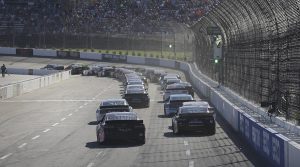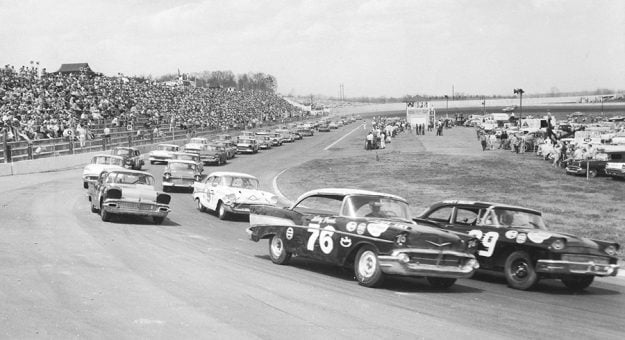Bill France, founder of NASCAR, offered further promotion of races and resources after the sanctioning body began. France helped Earles buy out Rice and Lawrence, making Earles sole owner of the speedway. Even though NASCAR had partnered with Earles for decades, International Speedway Corp., which is now part of NASCAR, officially purchased Martinsville Speedway in 2004.
Campbell grew up at Martinsville Speedway and saw firsthand the enormous struggles his grandfather faced during the 1960s and ’70s.
“Very much like me, he loved fans and wanted to make sure they had a great time when they came to his facility,” Campbell said. “He did everything he could to make sure they wanted to come back. He spent a lot of time out there shaking hands and joking around and just having a good time with people that came here.
“That’s what kept this place going because you have to remember back then that was it,” Campbell noted. “That’s what made your money because we didn’t have TV for many years and no race sponsors. It was totally from admissions. You talk about guys that were track owners in that area, they risked everything they had to make things work.
“You didn’t have all these other sources of revenue. There was a lot of anxiety, a lot of worry and a lot of blood, sweat and tears that it took to make speedways work in that early era of racing. He learned how to do it and do it well. He really set the standard for others as time progressed.”

Campbell is able to draw from nearly six decades of memories.
“From the time I was old enough to know what was going on, this was my playground. It was my home,” Campbell said. “At the end of a Sunday race and transporters were leaving and seeing all the taillights, I was depressed as could be and wanted to cry because it was over. It was like Christmas to me and there was all this build up and anticipation and it was all over. And then it was months until the next one.”
Campbell’s memories include four consecutive wins by Fred Lorenzen from 1963 through ’65, Darrell Waltrip’s 11 wins from 1976 to ’89 and Richard Petty’s 15 Cup Series victories at the track.
“Of all the short tracks, I like Martinsville best,” Petty said before he retired from driving in 1992. “Now, maybe I’ve got that backward and I like it only because I’ve won there so often. I really don’t know. It’s not an easy track but it’s one that’s been good to me.”
Ricky Rudd won three races at Martinsville Speedway. It was a track where he felt success would come each time he raced there.
“I always looked forward to Martinsville,” Rudd said. “I’m not really sure why that was. I received three grandfather clocks because I won three races there during my career. I let two or three wins get away from me there as well. It was always one of those tracks that sort of fit my driving style. It seems like I always had cars that performed well there. I don’t really remember having any bad races there, where I was totally off the pace. A bad race there for me was maybe where we finished fifth or 10th.”
Geoff Bodine was a master in modifieds at Martinsville before his biggest victory came in the Cup Series for team owner Rick Hendrick on April 29, 1984.
“I had some incredible wins during my career but I have to say that first Cup Series win at Martinsville with Rick Hendrick was the most special to me,” Bodine said. “It was a huge win for me and a huge win for Rick because had we not won, Rick was going to close the doors at Hendrick Motorsports. There wasn’t going to be a Hendrick Motorsports. That has turned out to be the most important win for a lot of reasons for me, for NASCAR and for all the drivers that have driven for Rick. At that time, we didn’t know how important that win was, but it turned out to be huge.”
As was the building of Martinsville Speedway.
